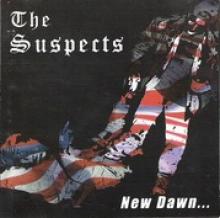But going back to revisit what one recalls as a lost punk classic occasionally results in some disappointment. Of course, the notes are all the same, it’s just that you don’t always have ten of your drunken, idiot friends around to sing the choruses with.
All of that’s pointed towards Washington DC’s the Suspects. And no, they don’t stink, but after more than a decade away from its music, the Suspects weren’t exactly what I recalled. That being said, tracks like “Pistol Whipped, ”from 1996’s New Dawn in the 21st Century, are more than capable of standing next to any other work from the ‘90s. And by comparison, the song would appear to place the band amongst the upper echelon of that huge street punk thing that cropped up.
There’s at least a little bit of that Oi! influence that was going around at time. But the vocals are perhaps more aggressive than anything found in the genre during the final decade of the 20th century. Part of the reason that this all came off so well is due to the fact that Marty Munsch, of Punk Rock Records fame, helmed the sessions. That alone probably accounts for the crispness of the bass line that’s so prominent in “Pistol Whipped.”
Munsch is still a well respected and highly sought after producer. On the Suspects’ disc, though, it becomes clear very early on that there’s not going to be too much space left in the mix. Every note has been devised to create a wash of endless sound. At times, as on “No Escape” each disparate element of the band gets drowned out as it approaches thrash territory for a moment.
In the ability of not just Munsch, but the Suspects as well, that brings such an enthusiastic and broad approach to the genre and makes New Dawn in the 21st Century an effort that’s worth revisiting. All the sing alongs don’t hurt too much, even if your old tyme friends are gone.
As the decade came to a close, it would appear that the Suspects and its volatile line up dispersed. That was the case with most bands that trod the street punk path. Unfortunately, that leaves us with the question as to why that scene all but disappeared. Granted, there are groups working in that vein today, but none as popular or prolific as, let’s say Dropkick before it turned into an old man’s Irish band. There’s no answer, but that entire street punk thing needs to be properly examined before all this old folks forget the answers to the questions we have.
